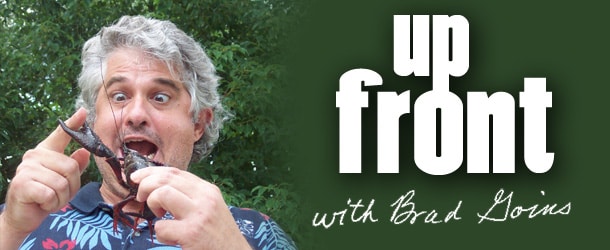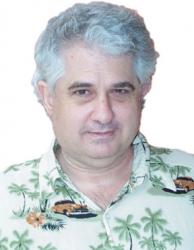If you’re looking for a short, fast read on an obscure chapter in rural Louisiana history, Larry Jorgensen’s new book Hot Wells: A Louisiana Ghost is an ideal choice.
Hot Wells began in the 1830s as Howerton Hill, a tiny community 15 miles north of Alexandria.
It was an oil-drilling crew that tapped into the waters of Hot Wells in 1913. The waters, which were loaded with magnesium and three forms of calcium, were said to remove much of the eczema from driller William Jordan’s hands in a single hand-washing. He said that daily washing with the waters eventually took away the affliction altogether.
When businessmen began the Hot Wells Sanitarium Co. in 1917, they complemented the sanitarium with its healing waters with a 22-room hotel, restaurant, dance pavilion, spa and a mineral water swimming pool. The spot became so popular that in the 1920s, an aspiring politician named Huey Long gave his first stump speech there.
Problems began in the 1930s when it was discovered that the minerals in the water were all but destroying the plumbing that carried it. Worsening a bad situation, the Great Depression took a big bite out of the tourist business.
Gov. Jimmy Davis thought that in spite of its rough patches, Hot Wells would eventually be for Louisiana what Hot Springs was for Arkansas. This was one occasion on which the singing governor was wrong.
In 1938, Hot Wells became part of the Louisiana Dept. of Hospitals. Earl Long’s administration lavished money on the resort in an effort to keep it shored up and somehow make it popular again. By the mid-1950s, state investment in Hot Wells had surpassed $1 million.
The prices at Hot Wells were right. At the hotel and tourist court, rates were $1.50 a night. A mineral bath cost $1. But low prices just meant bigger losses.
The state kept fighting a losing battle to attract tourists to a site in which they had lost interest. By the mid-1970s, Hot Wells was losing $200,000 a year.
By means of very creative financing, the state was able to reopen a fully repaired Hot Wells resort by 1983. But most of the tourists who came went there to fish at nearby Lake Cotille. And the spot began to get a bad reputation as a place where questionable characters could hide out from those who were looking for them.
For a time, the state used Hot Wells as a National Guard training facility. But in 1995, the Legislature dumped Hot Wells into the lap of the Rapides Parish Police Jury. The parish responded by repeatedly asking the Legislation to allocate funds. All requests were denied except one; in 2006 the Legislature voted to spend $500,000 to demolish the resort.
Jorgensen says the few Hot Wells buildings that still stand constitute a ghost town. His book contains dozens of black and white photos of old Hot Wells buildings and present-day ruins. Jorgensen does a good job of using photos that contrast buildings that were in their prime with the later, collapsing structures. There are several excellent shots of debris, decay and vandalism in buildings that are no longer extant. The book’s cover features a beautiful, wrap-around color photo of four ghost town buildings.
The retail price of Hot Wells: A Louisiana Ghost is $19. For info on buying a copy, call 337-591-1937 or email glmanagement40@gmail.com.
Meet Red Barn Amber
Crawfish Town USA has been working with Bayou Teche Brewing to give Louisianans a new specialty brew — Red Barn Amber.
Crawfish Town USA is a popular spot in Henderson, which is a few miles east of Lafayette. On the site, there’s also a market that offers such rareties as turtle meat, packs of crawfish burgers and six kinds of boulettes.
Red Barn Amber was introduced to the public during a “Super Bowl Mambo” held at Crawfish Town USA. Guests could partake of an entire roasted pig and an entire roasted alligator free of charge. Sounds just about perfect for the launching of a new handcrafted Louisiana brew.
My Mardi Gras Story
Of course, I didn’t go to a ball or a gala or a parade or anything. However, I did have a friend tell me her internet quit working the Saturday morning before Mardi Gras. She assumed, reasonably enough, I guess, that nobody around here was going to come out and fix that on a weekend.
But then (again, reasonably enough, I suppose), she called her internet provider on Monday morning and asked for a repairman to be sent out. She was told that wouldn’t happen because a bunch of people had taken off work for Mardi Gras.
“Well,” I told her, “at that point, I would have said, ‘OK. Just cancel the service.’” She said, “I threatened to do that.” To that I responded, “It doesn’t do any good to threaten to do it. Everybody threatens to do it.”
So, the great big company can’t come out and give you back your internet because a bunch of its workers took off early for Mardi Gras. That’s a great business model, isn’t it?
Now, some of my loyal readers who’ve spent their whole lives here may wonder why I pose such a question. Some readers may be thinking, “well, every place I’ve worked, I took off the day before Mardi Gras, and also the Friday and maybe the Thursday before Mardi Gras. I usually took the day after Mardi Gras off, too. Pretty much everybody I know did that.”
Well, that’s cool. But it might be worthwhile to know that there are some other, different places where things aren’t done that way. These places don’t celebrate Mardi Gras. But they do have holidays — like July 4. I mean, everybody — or a great many people, anyway — take off July 4 everywhere.
But imagine that some worker in these other places asked an employer if he could take the day before July 4 off. He’d likely be told something like this: “Sure, you can take off the day before July 4. In fact, you can take off as many days as you like — because if you aren’t here the day before July 4, you won’t be working here any more, and you’ll be able to do pretty much what you like.”
And if the employer really liked the employee — really thought the employee had some potential — he might add something like, “The whole reason I’m in a position to employ you in the first place is that I work seven days a week, and more than eight hours a day. Fortunately, you’re in a position to work a little less.”
To get back to my Lake Charles friend with the internet problem, her internet provider told her a repairman would come out to her place on the day after Mardi Gras. At 4 pm, she called her internet provider and informed the phone jockey that no one had shown up. She was told that — well — she was on the list to be seen that day. She was on the list.
Have you already guessed that she called again at 4 pm the next day? This time the excuse was that the repairmen were backed up. When she called the next day, she wasn’t even given an excuse. The phone operator just said she would try to see what the hold-up was.
As John Tavolta said in Get Shorty, “I can’t believe the way you do business out here.” I’ve quit asking my friend what excuses she gets in her daily calls to her internet provider. As I write this, she’s going on 17 days without internet. She has yet to see a repairman.
It’s a great business model. A fantastic business model. For Louisiana.
And here’s a business model that works in every place on the face of the earth: say, “OK. Just cancel the service.”
Huh?
“With Mardi Gras being early and taking place at the same time as Super Bowl Sunday and while the rodeo was in town did hurt some of the events, like the boat parade.”
— KPLC, “Organizers respond to Lake Charles Mardi Gras complaints,” Feb. 10
The News
“Taylor Swift Meets Up With Calvin Harris and Dances With Selena Gomez: Inside the Grammys 2016 After-parties”
— E! Online; ranked the No. 2 story in Google News’ “Top Stories” for Feb. 17.
Something To Do When We Aren’t Thinking
The Feb. 25 issue of The New York Review Of Books included the story “We Are Hopelessly Hooked,” by Jacob Weisberg. Weisberg aimed to demonstrate that most of us are addicted to digital media.
Weisberg gets to the funnies right away, beginning with a 1957 statement by Dwight McDonald: “As smoking gives us something to do with our hands when we aren’t using them, Time gives us something to do when we aren’t thinking.”
Weisberg asserts that in 2016, “not carrying a smartphone” indicates “eccentricity, social marginalization or old age.” May I suggest that I am living proof that it can indicate all three?
Weisberg argues that by using digital media an average of 5 1/2 hours a day, Americans aren’t doing a lot for their thinking skills and are losing their social skills at a furious rate. That 5 1/2 hours is the average, of course. Rates vary among groups. Weisberg says female students at Baylor University are presently using their cell phones an average of 10 hours a day.
Don’t want to read the whole story? Just read the Up Fronter’s short version: Corporations that make products you find addictive can and do take a lot of your money.
The Funnies
Mahalik (Anthony Anderson): She told me that she heard a zombie going through her trash the other day. The next morning, she turned up missing.
C.J. (Kevin Hart): What? OK, back up. How in the hell do you “turn up missing”?
Mahalik: ‘Cause nobody knows where you are when they realize you ain’t there!
C.J.: So you telling me that you can appear and disappear at the same time?
Mahalik: No, man. You can’t appear and disappear at the same time.
C.J.: Mmm. No, no. But you can’t be gone from one place and show up somewhere else entirely. So when you turn up, you’re never missing. And when you’re missing, you never turn up.
— Scary Movie 4 (2006, dir. Zucker bros.)















Comments are closed.